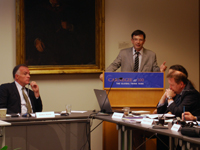IMGXYZ3239IMGZYXCorruption remains a serious hindrance to increased trade and investment between the United States and Russia. Carnegie joined the Center for Business Ethics and Corporate Governance in hosting a roundtable discussion with U.S. business leaders and Russian government officials about how to build strong institutions, develop better business practices, and enforce compliance. Carnegie’s James F. Collins welcomed the speakers and Matthew Murray from the Center for Business Ethics moderated.
Russian Perspectives
- Fighting Corruption: Aleksey Rozuvan, a member of the Committee on Security in the Russian Duma, described corruption as a global challenge and one of the most serious problems affecting Russia today. He argued that the Russian government is working hard to address this issue. In May 2011, Russia signed the OECD Anti-Bribery Convention, an important step in President Medvedev’s anti-corruption campaign. In an effort to increase transparency, there are also discussions underway about requiring more government officials to declare their income in more detail, he added.
- Prosecution: According to Vladimir Vedernikov from the Anti-Corruption Department of the Office of the Prosecutor General of Russia, his department supported cases against 12,500 individuals accused of corruption in 2010. All prosecutions are carried out in accordance with the rule of law and protection of human rights, he added. The Prosecutor’s Office is responsible not only for enforcement but also for proposing solutions to existing gaps in legislation. Vedernikov explained that the office is currently working on a legislative initiative that will provide protection to whistleblowers and generally improve the business environment in Russia.
U.S.-Russia Cooperation
- Unrealized Potential: According to Murray, only 4 percent of Russian imports come from the United States – a lower percentage than at the end of the Cold War. Since the 1990s, U.S. foreign direct investment (FDI) in Russia has decreased in comparison to U.S. FDI in Europe, he added.
- Engagement: In November 2010, all G-20 member states signed the Anti-Corruption Action Plan condemning corruption as a serious threat to market integrity, Murray said. The year before, a U.S.-Russia working group on anti-corruption and institutional integrity was established. This group helped convince the Russian government to take final steps required to join the OECD Anti-Bribery Convention's Working Group and to further implement the UN Convention Against Corruption. In January 2010, this group also met with important political figures from the United States and Russia under the auspices of the Bilateral Presidential Commission to reaffirm their commitment to the fight against corruption.
- The Next Step: As a new member of the OECD Anti-Bribery Convention, Russia should also consider implementing other OECD recommendations, such as encouraging businesses to establish good internal controls and audit committees and engaging with smaller businesses, Murray added.
Insights from U.S. Business Leaders
- “Culture of Compliance”: Several U.S. business representatives stressed the importance of establishing compliance programs and fostering a culture of integrity in the private sector and within companies themselves. According to Stephanie Meltzer from the Pfizer Corporation, Pfizer uses an internal code of conduct for all employees across the globe in order to ensure uniform standards and conducts corporate audits and proactive reviews to evaluate and enforce compliance. When prevention fails and violations occur, an effective detection and response procedure is vital, argued Sandy Merber, Senior Advisor of Regulatory Affairs at General Electric.
- Assessing Risk: Steve Biegun, Vice President of the International Government Affairs division at Ford, emphasized that his company always assesses potential risks before entering a new market. When Ford re-entered the Russian market in 2002 as the first foreign automobile company in post-Soviet Russia, the issue of corruption was a major concern, he said. Corruption is a serious threat to companies’ reputation and integrity, Gary Litman of the U.S. Chamber of Commerce concluded.
Conclusion
At the recent U.S.-Russia Business Council meeting in Chicago, Deputy Secretary of State William Burns spoke of a new “Sputnik moment” where businesses, civil society leaders, and government officials in the United States and Russia could work together to address shared challenges. Russia’s accession to the World Trade Organization is one such area for potential cooperation. Once a good compliance culture and zero tolerance for corruption become institutionalized principles within corporations, the effects will start to spread throughout society as well, Murray concluded.
